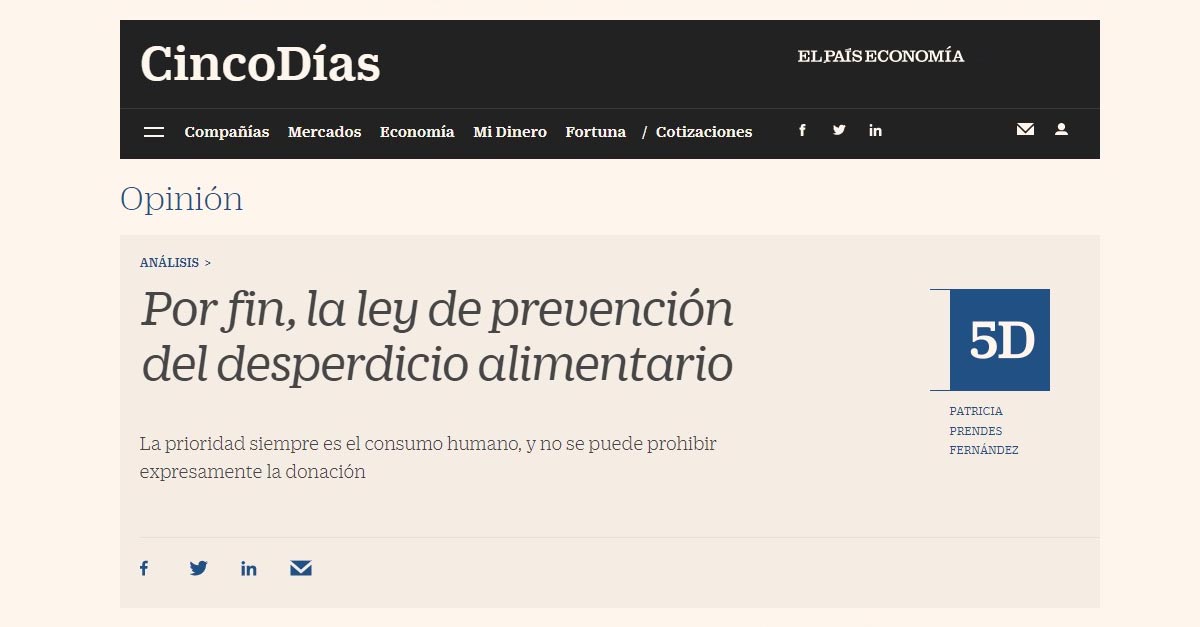Finally, the law for the prevention of food waste

Article written by Patricia Prendes, director of the agrarian law department and published in the newspaper Cinco Días.
On June 7, the Council of Ministers approved the draft Law for the Prevention of Food Losses and Waste. It constitutes the first regulation in Spain on the matter, which aims to reduce the waste of unconsumed food to the garbage and favor a better use of these. It tries to curb the waste of food, but also of the resources used to produce them, the human, technical and economic efforts invested, as well as the added value that is achieved with work and dedication.
At the international level, within the UN High-Level Forum for Food and Agriculture, held in Rome in 2009, the document How Feeding the World in 2050, which highlighted the need to increase food production to meet the growing demand of a growing population and the need to address losses and waste. Sustainable Development Goal 12 of the UN 2030 Agenda is to “halve per capita food waste corresponding to retail and consumer levels and reduce food loss along food chains of production and supply”.
The Spanish Government, by approving this first regulation, complies with the commitments acquired with the 2030 Agenda. On the other hand, the Spanish Circular Economy Strategy has set as objectives to reduce the generation food waste by 50% per capita in terms of household and retail consumption, and 20% in production and supply chains; It has already been applied since 2020.
The Law for the Prevention of Food Loss and Waste seeks to establish a hierarchy of priorities; facilitate the donation of food; and contribute to meeting the food needs of the most vulnerable, with the general purpose of achieving more sustainable production and consumption, and raising awareness among all the agents in the chain in proper food management. The standard applies to activities carried out in Spanish territory by agents of the food chain, whether they are production, transformation, food distribution, hospitality, other entities and associations for the distribution of donated food, and the Administration.
Article 5 of the law establishes that all agents in the chain have the obligation to have a loss and waste prevention plan. Companies have to make a diagnosis of their production processes, detect where food losses occur, and establish measures to minimize them, so that they are used for other uses. In any case, it is possible to adapt the actions according to the characteristics of the sector, justifying the reasons. The top priority is always human consumption, through the distribution or redistribution of food.
To carry out the donation, agents must sign collaboration agreements with companies, social initiative entities and other non-profit organizations, such as food banks. The agreements must expressly include the conditions for the collection, transport and storage of the products, among other issues. The donation cannot be expressly prevented, something that would be null and void. Social initiative entities that receive donations must guarantee the traceability of the donated products through a system of entry and exit registration of those received and delivered. In no case should this food be used for sale, and it must be distributed without discrimination among the beneficiaries.
Another of the norm’s priorities is to transform unsold food into juices or jams. When the food is no longer suitable for human consumption, it will be used mainly for animal feed, for the distribution of feed and, secondly, for obtaining compost or biofuels.
According to article 8, hospitality companies and other food service providers will have the obligation to provide the consumer with the possibility of taking, without cost, the food that has not been consumed , as well as informing of this possibility clearly and visibly in the establishment. Containers suitable for food use, reusable or easily recyclable will be used for this purpose.
Chapter III of the legal text establishes good practice measures for the Administration and the different links in the chain that prevent food waste, such as encouraging the sale of products with Best before or expiration date.
As part of the good practice measures for the hospitality sector and other food service providers, public administrations may promote the flexibility of menus so that consumers can choose the garnish or portions of different sizes, encourage the donation of food for social purposes, etc.
The Government must adapt the guidelines of the European institutions to prepare a strategic plan for the prevention and reduction of food losses and waste, which will contain the general strategy of the waste policy , the guidelines and the structure to which the regional programs must comply, as well as the minimum objectives to be met for the prevention and reduction of losses and waste, which must be consistent with the strategic planning on food waste.
The Ministry of Agriculture, Fisheries and Food will make a report in which it will collect the result of the execution of the National Plan for the Control of Food Losses and Waste, developed by the Administrations competent.
Chapter VI contains the sanctioning regime, classifying infringements in terms of food losses and waste as: very serious, serious and minor. These infractions are compatible with civil, criminal and other actions that may occur. Penalties can vary between 2,001 and 60,000 euros.
As an example, minor infractions are considered not to apply the hierarchy of priorities to food losses and waste, or not to justify why it is not applied. They constitute serious infractions, among others, not having a food loss and waste prevention plan in case of being obliged to do so, or discriminating in access to the distribution of food for reasons of disability, age, sex, etc And the second or subsequent serious offense that involves reiteration with any other serious offense committed within a period of two years is considered a very serious offense.
You can read the article in the newspaper here .



















